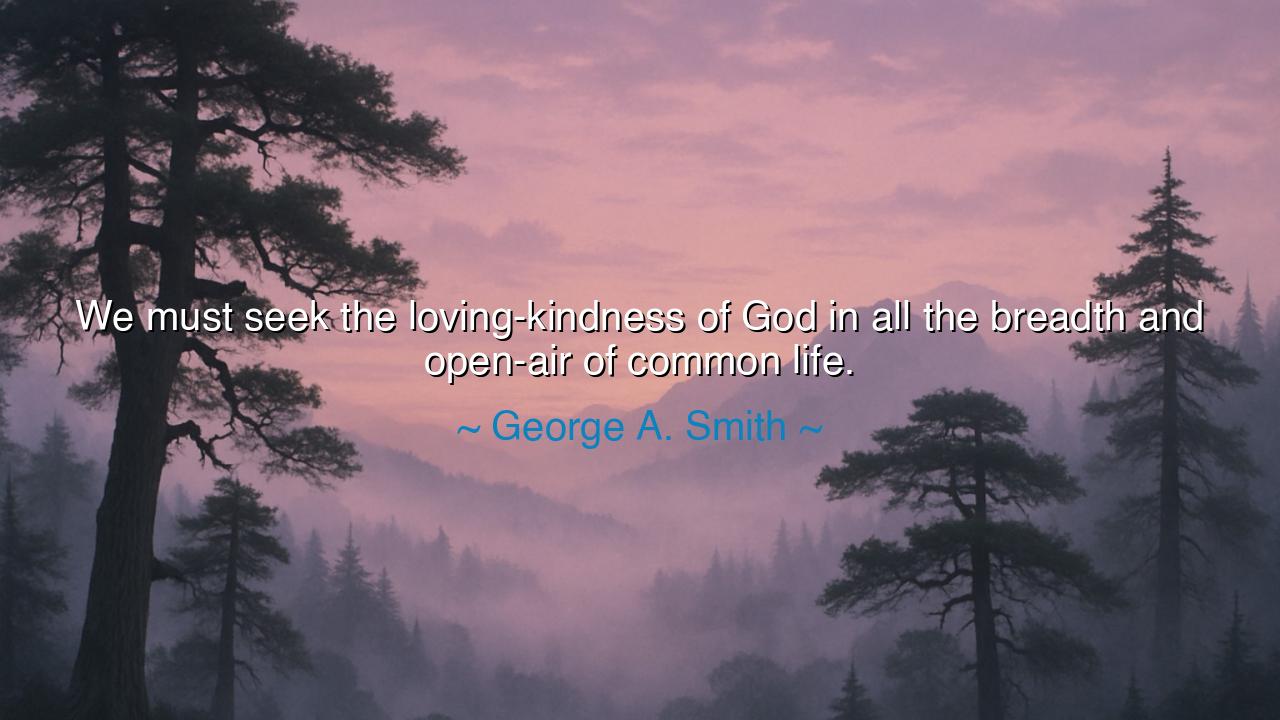
We must seek the loving-kindness of God in all the breadth and
We must seek the loving-kindness of God in all the breadth and open-air of common life.






“We must seek the loving-kindness of God in all the breadth and open-air of common life.” Thus spoke George Adam Smith, the Scottish theologian whose heart was both contemplative and alive to the world. In this brief yet radiant saying, he reminds us that the divine is not confined to temples, nor locked within sacred texts, nor hidden behind ritual — but lives and breathes amidst the ordinary. He calls upon us to open our eyes to the loving-kindness of God, not in the cloistered halls of religion alone, but in the open-air — in the rhythm of daily labor, the laughter of children, the courage of those who suffer, and the endless unfolding of the earth.
Smith lived in the late nineteenth century, a time when faith was being tested by modern science, reason, and the rapid transformation of society. Many believed that to find God, one must flee the world — escape into silence, into study, or into the sanctity of the church. But Smith, drawing from both the Scriptures and the pulse of human life, proclaimed the opposite truth: that God is immanent, not distant; that the sacred is woven into the fabric of the everyday. To “seek the loving-kindness of God” is to look for His presence not in isolation, but in relationship, not in perfection, but in participation with the life around us.
To understand this saying, we must first ponder what is meant by “the loving-kindness of God.” It is that tender mercy which sustains creation — the grace that gives rain to the fields, forgiveness to the fallen, and hope to the weary. But Smith warns that we will not find it if we only look upward, as though heaven were far away. We must look outward — to the breadth of life, to the open sky where all people live and move. The divine presence is not a treasure buried deep within the earth; it is the light itself in which the earth is seen.
Consider the life of Francis of Assisi, the saint who saw the face of God in the sun and moon, in the birds and in the leper’s wounds. Francis did not discover God through grand sermons or philosophy, but through the common life of creation — through his kinship with all living things. When he preached to the sparrows, it was not madness, but wisdom. He knew what George A. Smith would later echo — that God’s loving-kindness fills the open air, that holiness dwells not in separation from life, but in loving it deeply, purely, and reverently.
Smith’s words challenge the weary soul who believes that the sacred is distant, or that spirituality requires withdrawal from the world. He calls us instead to find divinity in the midst of humanity — in acts of service, in the beauty of labor, in the compassion we offer and receive. The merchant, the teacher, the mother, the artist — all may walk with God if their hearts are open to kindness. The field of faith is not the monastery alone; it is the marketplace, the street, the kitchen, the field under heaven’s wide roof. The “breadth and open-air of common life” are themselves the altars of divine presence.
To seek the loving-kindness of God in the ordinary is also to live with gratitude. It is to awaken each morning and see the sacred in sunlight and in struggle, in laughter and in loss. It is to know that every moment offers a revelation — if only we have the eyes to perceive it. The divine does not speak in thunder only; sometimes it murmurs in the rustle of leaves, in the gentleness of forgiveness, in the stillness after a storm. The heart that loves will find God everywhere, even in what seems small and broken.
So, O children of the earth, take this teaching to heart: do not search for heaven beyond the stars while neglecting the holiness beneath your feet. Seek the loving-kindness of God where you are — in the open-air of your daily existence. Be present to the life around you, to its beauty and its ache, for in doing so, you dwell already within the divine presence. Let your faith breathe; let it live among the people, in the markets and in the meadows, in the home and in the heart.
For in the end, as George A. Smith knew, God’s love is not confined to the sacred place — it sanctifies all places. The truest worship is not escape from the world, but the embrace of it. To live kindly, to see beauty, to forgive, to serve, to breathe deeply of this shared life — this is to walk with God in the open air, and to find eternity shining quietly within the common day.






AAdministratorAdministrator
Welcome, honored guests. Please leave a comment, we will respond soon